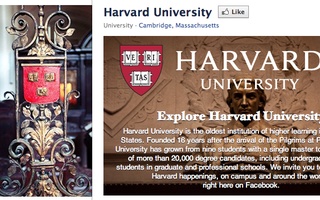Students and entrepreneurs headed to the Harvard Business School this weekend for “Cyberposium: 17, Sky’s the Limit?,” packing into rooms of Aldrich Hall to hear from industry leaders about the state of the booming tech industry.
The Business School’s TechMedia Club organized the seventeenth annual tech conference, the largest in the world held at a business school. This year, panelists focused on the industry’s prosperity and the field’s increasingly quantitative bend.
When discussing the industry’s growth trajectory, speakers emphasized that the technology field has undergone “a revolution, not an evolution.”
“There was no such thing as an ‘App Store’ four years ago,” Jim Cox of Microsoft said during the “Mobile Gaming” panel.
“Mobile Gaming” panelists included top dogs in the industry such as Chris Gibbs, EA Mobile executive producers, and Justin Cinicolo, a general manager at Zynga, which has designed prominent Facebook games such as FarmVille.
Gibbs, Cinicolo, and others discussed how mobile devices, such as smartphones and tablet computers, have pushed companies to cater to the general public, an audience to which the gaming industry was once unaccustomed.
“The word ‘gamer’ is now defunct,” Cox said. “It used to be the group of hard-core guys taking head shots in Halo. Now the gamer is all of us.”
But, while the mobile games industry is becoming bigger and more profitable, the mobile platform does have some limitations, panelists said.
This platform limits designers in game complexity. In addition, mobile gaming also tends to be less social, putting the industry at a cross current with the growing tide of social media, as Harlan Crystal, CTO and co-founder of game developer Pocket Gems, pointed out.
Later in the day, “eBooks: From Print to Digital,” focused on how the publishing industry has made the transition to digital print.
The questions posed by the moderator and the students in attendance drove the conversation predominantly toward electronic textbooks and their role in the student book market.
“Spending $500 every semester on text books that you only read a few chapters of, I do not like it,” said one student in attendance, who raised her hand and stood up to make this remark in the middle of the panel.
Nathan Schultz, vice-president at Chegg, a digital book distributor, emphasized the need for publishers to adapt to the demands of students as they begin to push for more specialized content that may only be book excerpts instead of entire tomes.
Many panelists agreed on the vast potential for digital print to maximize the reading experience beyond words on a page.
Peter Coffee, vice-president and head of platform research at marketing company salesforce.com, said that though the popularity of the digital books has increased, the books would be even more successful if digital publishers moved away from models established by print publishers.
“At some point, you have to re-think instead of merely refining, and that’s what I hope will happen to the idea of what we used to call a ‘book,’” Coffee said.
“When I highlight a Kindle book, I can go to my Kindle account on the Web and I can review all of those highlights —or search them—or expand the context around any one of them—or make them public,” Coffee added in an email. “This is a lot more than merely changing the medium of expression; it creates new and valuable forms of expression, or rather it hugely lowers the cost of those forms—to the point that many more people will use them.”
While the prevalence of technology underlaid many of the classroom discussions, those in attendance illustrated the trend well, as students and entrepreneurs texted, tweeted, and browsed the Internet on pocket devices throughout the day.
Read more in News
HMS Professor Awarded Congressional Gold MedalRecommended Articles
-
Harvard Partners With Mobile Social Networking AppHarvard natives and visitors will be able to explore the historic expanse of Harvard Yard and Harvard Square with greater ease as a result of a partnership with a mobile social networking application called foursquare, the University announced on Tuesday.
-
Harvard Pushes Social Media With New ApplicationWhen Facebook founder Mark E. Zuckerberg ’06 thumbed his nose at Harvard’s administration and created a social networking site he, now famously, declared “I can do it better than they can, and I can do it in a week.”
-
The Mobile Revolution
-
 Harvard University Facebook Page Reaches 500,000 Fans
Harvard University Facebook Page Reaches 500,000 Fans -
Computer Science Professor Finds Yelp LeakA team of computer scientists from Harvard, Yale, and Boston University recently discovered a security leak in the mobile version of Yelp.
-
The Family Van Makes Boston a Healthier CityFounded in 1992 by current Medical School Dean for Students Nancy E. Oriol, The Family Van hits the streets of Boston six days a week.













